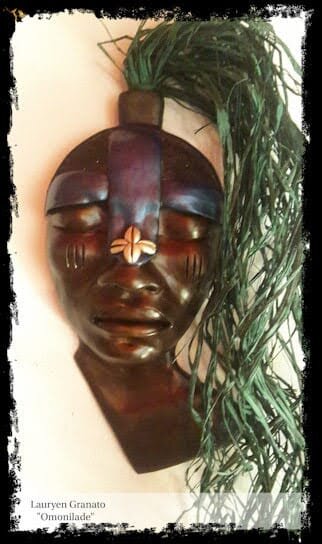Ogum
Ogum is a warrior or, better, he is the warrior among the Orixás.
He is one of those deities whose origin is historical. In fact, it is said that he was the most courageous of the sons of Odudua, king of the city of Ire.
He is called: Ògún onire (Ogum of the city of Ire) and also Ògún méje logun mi (my Ogum of the seven wars).
According to the myth, Ogum is the son of Iyemanjá, older brother of Exú and Oxossi. They say he was very close to Oxossi. He taught Oxossi how to go to the forest to hunt and support his family. In fact, he was the first hunter, but thanks to his innate courage, when the moment of danger came, he was the only one left to defend his family and his tribe. One day he was late for hunting. When he got home, he found the house on fire, assaulted by criminals. He was furious and killed everyone. That was how Ogum's true nature manifested itself. He therefore decided to leave the hunt, leave his hometown and go around the world to fight battles and become a conqueror. He was the founder of the country and the conqueror of new lands. His glory grew. He returned home only after many years, when he was already known for his courage, his indomitation, his great skill as a warrior. But once he was settled, he had to go on to another cruel war. Saying goodbye to his wife and children, he ordered them, during his absence, to choose a day of the week when they worshiped him and during which no one would have spoken as a form of respect. That is what happened. Ogun stayed away for seven years. When he was finally back and entered the city, he was covered in dust, tired and unrecognizable. He stopped at a house, asked for some water and food, but no one answered. The same scene happened in another house, and again and again. Everywhere people were silent and nobody took care of him, everyone was busy with what they were doing. Ogun was incredibly furious: he started attacking whoever he was going to meet and his anger was so great that the people around him finally recognized that that beggar was the king. But it was too late: no one could calm him down. It took Exú to intervene and appease his brother. When he was finally calm and it was possible to speak to him, his children explained that if people had not responded to his search for food and water it was not out of lack of respect, but because they did not recognize him. And the people of the city had not become selfless heartless people: on the contrary, they were all confident and obedient people who recognized the supreme value of their king's orders. Since it was the holy day dedicated to worshiping him, no one spoke, not even to help a beggar in need.
Ogum embodies the energy of metals.
He represents the vital energy of constant transformation; the strength we need to win our battles, to achieve our goals by overcoming our enemies.
Ogum is constantly on the move, constantly changing, changing something.
Ogum is in human evolution, in technology, in buildings, in the streets, in life and death.
Wherever something is evolving, there is Ogum.
Ogum does not support loneliness.
We can find him in people who are strong, indomitable, proud, but also prone to being angry and who are irrational for no reason.
Due to these characteristics, these people sometimes act without thinking, but then they are able to stop, reflect and find a remedy for their mistakes.
Even Ogum's temperament is perpetually changing.
Ògún ye! Mo ye!

